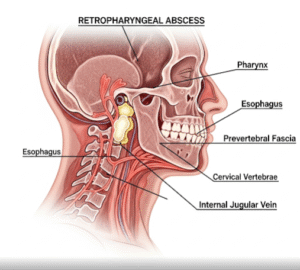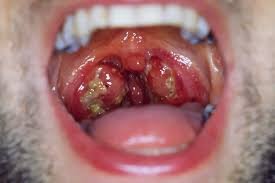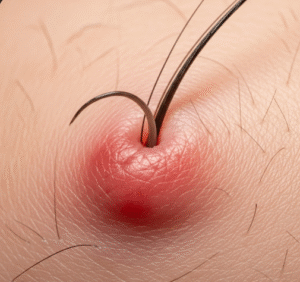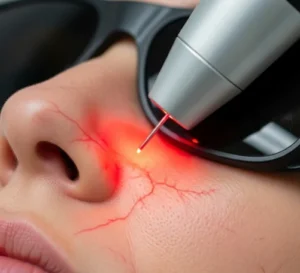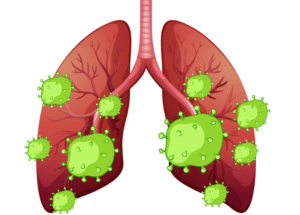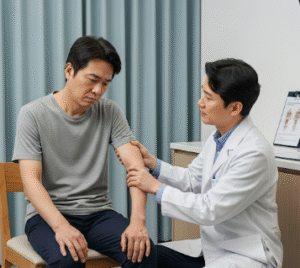➤ Overview
Swollen glands, medically known as lymphadenopathy, refer to enlarged lymph nodes, which are part of the body’s immune system. These nodes act as filters for harmful substances and help fight infections. Swelling occurs when lymph nodes become inflamed due to infection, immune response, or malignancy.
In South Korea, swollen glands are commonly assessed by primary care physicians, ENT specialists, and hematologists using clinical examination, imaging, and laboratory tests. Proper evaluation ensures accurate diagnosis, timely treatment, and prevention of complications.
➤ Key Facts
→ Swollen glands can occur anywhere lymph nodes are present, commonly in the neck, armpits, and groin.
→ Causes range from common infections to serious systemic diseases.
→ In Korea, doctors use ultrasound, blood tests, CT scans, and biopsy to determine the cause.
→ Swollen lymph nodes are often painful when due to infection, but painless swelling may suggest more serious causes, such as cancer.
→ Children frequently experience temporary lymph node enlargement due to minor infections.
→ Chronic or persistent swelling requires specialist evaluation to rule out malignancies.
→ Treatment depends on the underlying cause, whether infection, autoimmune disease, or malignancy.
➤ What is Swollen Glands?
Swollen glands are enlarged lymph nodes that occur as a response to infection, inflammation, or abnormal cell growth:
→ Acute lymphadenopathy – Rapid enlargement due to infections such as colds, flu, or strep throat.
→ Chronic lymphadenopathy – Persistent swelling lasting more than a few weeks, often linked to autoimmune disorders or malignancy.
→ Localized lymphadenopathy – Swelling limited to one area, commonly due to localized infection.
→ Generalized lymphadenopathy – Multiple regions affected, often signaling systemic illness.
→ Tender vs. non-tender nodes – Tender nodes often indicate infection, while non-tender nodes may suggest malignancy.
→ Soft vs. firm nodes – Firm, hard nodes require careful evaluation.
Korean physicians classify swollen glands based on location, size, texture, and associated symptoms to guide treatment.
➤ What Symptoms are Related to Swollen Glands?
Swollen glands may present alone or with additional symptoms depending on the underlying cause:
→ Visible swelling or lumps in the neck, armpits, or groin.
→ Pain or tenderness when touched, especially during infection.
→ Redness or warmth over affected nodes.
→ Fever or night sweats if due to infection or systemic illness.
→ Fatigue or malaise accompanying generalized swelling.
→ Unexplained weight loss in serious conditions like lymphoma.
→ Sore throat, cough, or cold symptoms if associated with upper respiratory infection.
→ Skin rashes or joint pain in autoimmune-related causes.
➤ What Causes / Possible Causes?
Swollen glands can result from infections, autoimmune disorders, or malignancies:
→ Viral infections – Common cold, influenza, mononucleosis, HIV.
→ Bacterial infections – Strep throat, tuberculosis, skin infections.
→ Parasitic infections – Toxoplasmosis or parasitic infestations.
→ Autoimmune diseases – Lupus, rheumatoid arthritis, or sarcoidosis.
→ Cancer – Lymphoma, leukemia, or metastasis from other tumors.
→ Medications – Certain drugs, such as anticonvulsants or antibiotics, may cause lymph node swelling.
→ Other conditions – Endocrine disorders, chronic inflammatory diseases, or rare genetic conditions.
➤ When Should I See My Doctor?
Medical evaluation is essential if swollen glands persist, are painful, or associated with systemic symptoms:
→ Swelling lasting more than two weeks without improvement.
→ Rapidly enlarging nodes or nodes larger than 2-3 cm.
→ Non-tender, hard, or fixed nodes.
→ Fever, night sweats, or unexplained weight loss.
→ Persistent fatigue or malaise.
→ Swelling in multiple regions suggesting systemic illness.
→ Children with swollen glands accompanied by difficulty breathing or swallowing.
Prompt evaluation in Korea ensures accurate diagnosis, early treatment, and prevention of serious complications.
➤ Care and Treatment
Treatment depends on the cause of swollen glands and may include medication, supportive care, or surgical intervention:
→ Treat underlying infection – Antibiotics for bacterial infections or antivirals for specific viral infections.
→ Pain relief and anti-inflammatory medications – Acetaminophen, ibuprofen, or NSAIDs to reduce tenderness.
→ Rest and hydration – Supporting the immune system during infection.
→ Warm compresses – To relieve localized pain or discomfort.
→ Monitoring – Regular evaluation for persistent or growing nodes.
→ Treatment of underlying autoimmune disease – Immunosuppressants or disease-specific therapy.
→ Surgical intervention – Biopsy or excision for diagnosis or treatment of malignancy.
→ Lifestyle measures – Healthy diet, stress management, and regular check-ups to maintain immune health.
➤ Treatment Options in Korea
South Korea provides advanced diagnostic and therapeutic care for swollen glands, ensuring precise evaluation and effective treatment:
Diagnosis in Korea
→ Clinical examination – Location, size, consistency, and tenderness assessment.
→ Laboratory tests – Complete blood count, infection markers, and autoimmune screening.
→ Imaging – Ultrasound, CT scan, or MRI for detailed evaluation of lymph nodes.
→ Biopsy – Fine-needle aspiration or excisional biopsy for suspected malignancy.
Medical Treatments in Korea
→ Infection management – Targeted antibiotics, antivirals, or antiparasitic medications.
→ Anti-inflammatory therapy – Reduces swelling and discomfort.
→ Management of autoimmune disorders – Specialized medication regimens tailored to individual patients.
Advanced Therapies in Korea
→ Minimally invasive procedures – Biopsy and localized surgical interventions.
→ Oncology care – Multidisciplinary teams for lymphoma, leukemia, or metastatic cancers.
→ Integrative medicine – Korean traditional medicine, acupuncture, or herbal therapy to support immune health.
Rehabilitation & Support in Korea
→ Education on immune system health and early detection of recurrent lymphadenopathy.
→ Regular monitoring to track changes in lymph node size and prevent complications.
→ Psychological support for patients experiencing anxiety or stress related to swelling or diagnosis.


